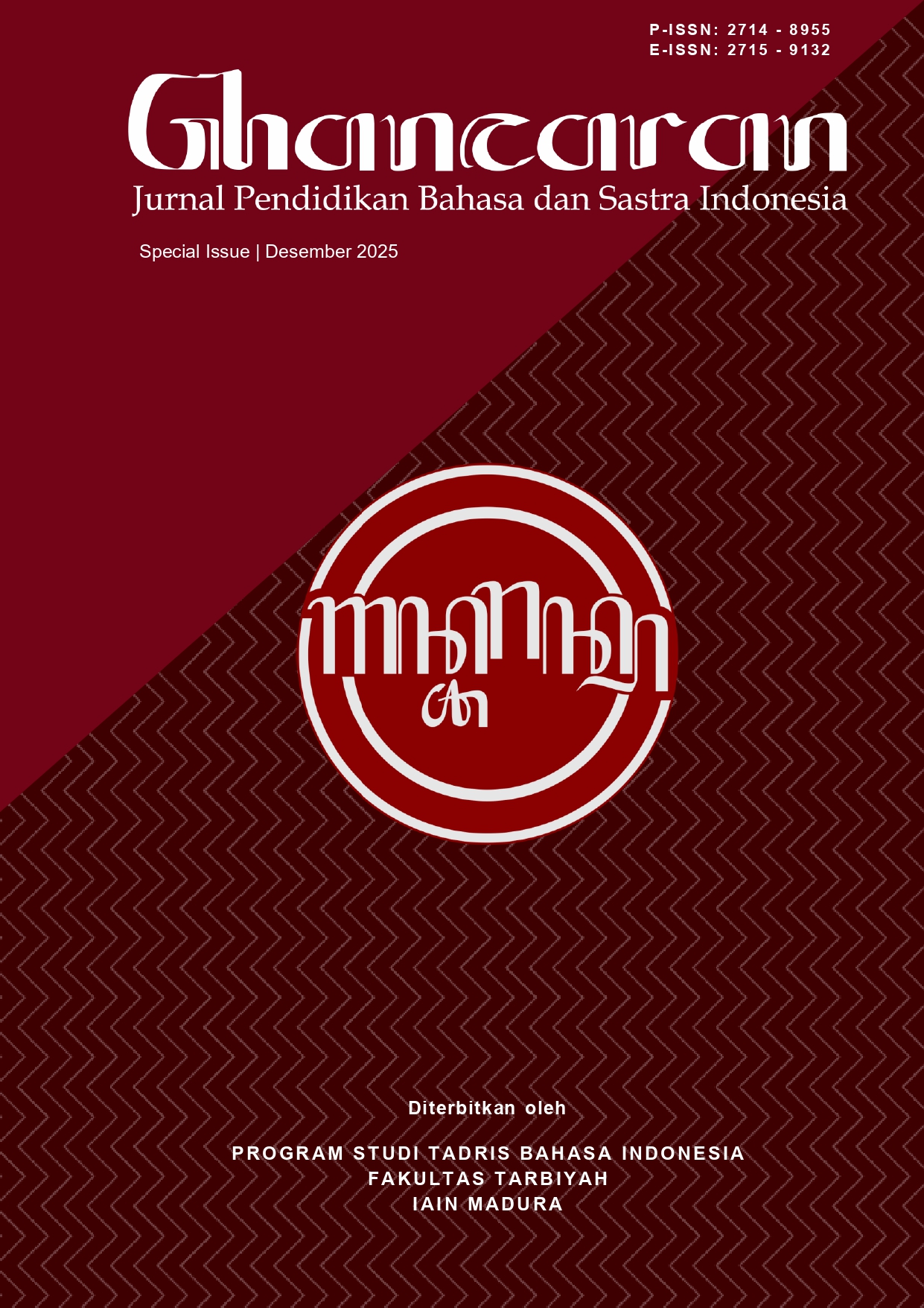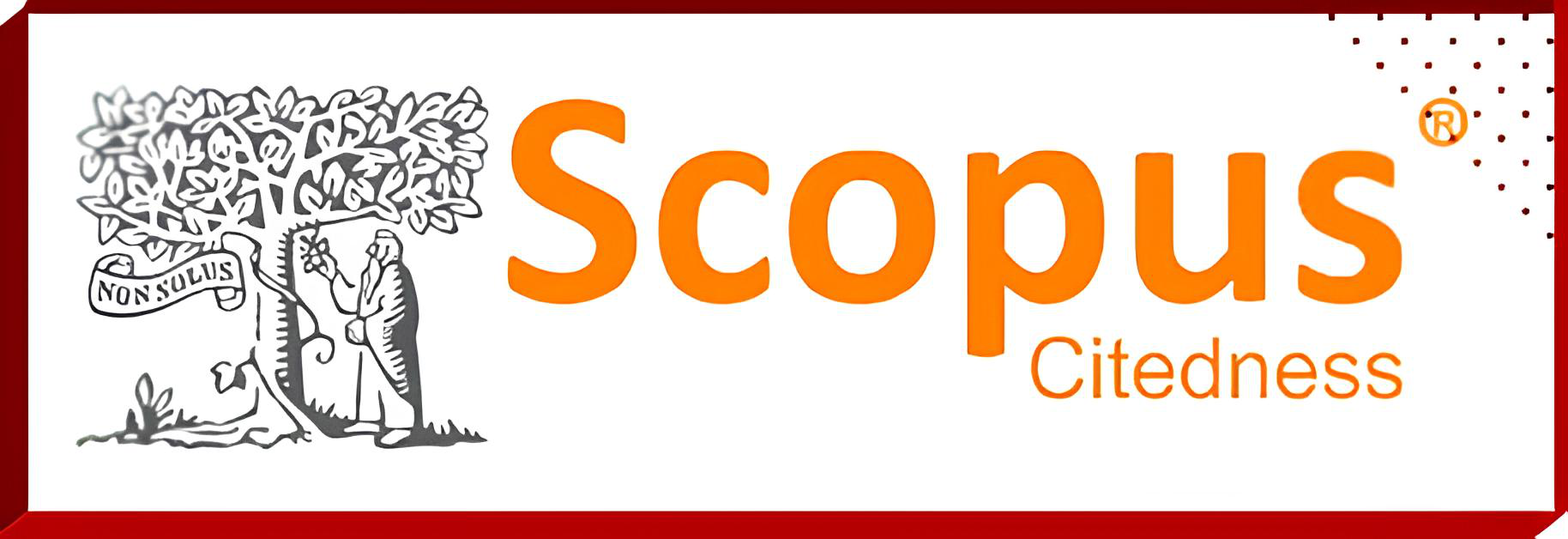Model Pembelajaran BIPA untuk Menguatkan Identitas Budaya dan Nasionalisme bagi Anak Diaspora
 Abstract views: 296
,
Abstract views: 296
,
 PDF downloads: 307
PDF downloads: 307
Abstract
The teaching of Indonesian as a Foreign Language (IFL) could be a tools in cultural diplomacy and a means of preserving national identity, while also possessing broader potential, not merely to introduce Indonesian to foreign speakers, but to restore a sense of ‘home’ in Indonesia for those with ancestral ties to the nation. This paper adopts a futurological perspective in language education to design an inclusive, adaptive, and culturally grounded model of BIPA, with a particular focus on reconnecting children of Indonesian descent abroad with the language and culture of their heritage. The paper evaluates the limitations of conventional BIPA approaches and proposes a hybrid model that integrates technology, personalization, and cultural activities to foster both nationalism and functional language skills. In the context of diaspora learners, collaboration among various stakeholders plays a crucial role in BIPA instruction, particularly in reintroducing Indonesian cultural values into the lives of these children.
Downloads
References
Andriyanto, O. D., Hardika, M., Darni, D., Sukarman, S., Susilo, Y., & Panich, P. (2024). The Exploration of Nusantara’s Local Wisdom Through Bahasa Indonesia Untuk Kita (Bikta) for Diaspora Children at the Indonesian Embassy in Doha Qatar. AL-ISHLAH: Jurnal Pendidikan, 16(2), 1707–1717.
Andriyanto, O. D., Hardika, M., Yulianto, B., Subandiyah, H., & Tjahjono, T. (2021). Tantangan dan Strategi Pembelajaran BIPA bagi Pemelajar Anak-Anak di Sekolah Satuan Pendidikan Kerjasama. Jurnal Pendidikan Bahasa dan Sastra Indonesia Metalingua, 6(2), 59–66.
Annisa, R. I., & Sumaludin, M. M. (2022). Challenges of Teaching Indonesian for Foreign Speakers (Bahasa Indonesia bagi Penutur Asing/BIPA) in Austria during the Pandemic Covid-19. Academic Journal PERSPECTIVE: Language, Education and Literatur, 10(2), 115–125.
Ardiyanti, W. N. (2024). The strengths and weaknesses of the BIPA curriculum as an Indonesian teaching guideline for foreign speakers: A review of the literature 2018-2023. Indonesian Journal of Curriculum and Educational Technology Studies, 12(2), 108–122.
As’ari, C. (2023). Pengembangan Modul Elektronik Keterampilan Berbicara BIPA 1 Berancangan Pendekatan Komunikatif bagi Pemelajar Diaspora Anak-anak [Tesis Tidak Diterbitkan]. Universitas Pendidikan Indonesia.
Badiozaman, I. F. A. (2021). Exploring online readiness in the context of the COVID 19 pandemic. Teaching in Higher Education, 1–19.
Balbay, S., & Erkan, G. (2021). Online Language Learning in Times of Crisis: Hindrance or Opportunity? Journal of Educational Technology and Online Learning.
Blake, R. J., GUILL�N, G., & THORNE, S. L. (2020). Brave New Digital Classroom (3rd ed.). Georgetown University Press; JSTOR.
Chen, Y. (2021). The Effect of Remote Learning on College Students. Proceedings of the 2021 4th International Conference on Humanities Education and Social Sciences (ICHESS 2021), 615.
Compton, L. K. L. (2009). Preparing language teachers to teach language online: A look at skills, roles, and responsibilities. Computer Assisted Language Learning, 22(1), 73–99.
Creswell, J. W., & Creswell, J. D. (2018). Research Design Qualitative, Quantitative, and Mixed Methods Approaches Fifth Edition. SAGE Publications Ltd.
Damanakis, M. (2017). Identity, Language, and Language Policies in the Diaspora: Historical-Comparative Approach. In P. P. Trifonas & T. Aravossitas (Eds.), Handbook of Research and Practice in Heritage Language Education (pp. 1–20). Springer International Publishing.
Defina, D. (2021). Penilaian Mahasiswa BIPA terhadap Pembelajaran Tatap Muka dan Online. Jurnal Bahasa Indonesia bagi Penutur Asing (JBIPA), 3(1), 12–23.
Dhawan, S. (2020). Online Learning: A Panacea in the Time of COVID-19 Crisis. Journal of Educational Technology Systems, 49(1), 5–22.
Diep, A. N., Zhu, C., Cocquyt, C., Greef, M. D., Vo, M. H., & Vanwing, T. (2019). Adult learners’ needs in online and blended learning. Australian Journal of Adult Learning, 59(2).
Dixon, F. A., Yssel, N., McConnell, J. M., & Hardin, T. (2014). Differentiated Instruction, Professional Development, and Teacher Efficacy. Journal for the Education of the Gifted, 37(2), 111–127.
Ellis, R. (1995). The Study of Second Language Acquisition. Oxford University Press.
Fishman, J. A. (1991). Reversing Language Shift: Theoretical and Empirical Foundations of Assistance to Threatened Language. Clevedon.
Fuad, M., Suyanto, E., Sumarno, Muhammad, U. A., & Suparman. (2022). A Bibliometric Analysis of Technology-Based Foreign Language Learning during the COVID-19 Pandemic: Direction for Indonesia Language Learning. International Journal of Information and Education Technology, 12(10), 983–995.
Gass, S. M., & Selinker, L. (2008). Second language acquisition: An introductory course (3rd ed). Routledge/Taylor and Francis Group.
Inthase, W., Suyitno, I., & Susanto, G. (2024). Technology Integration in BIPA Learning for Beginner Thai Students. GHANCARAN: Jurnal Pendidikan Bahasa Dan Sastra Indonesia, 5(2).
Isnaini, M., & Faizin. (2021). NARASI PERSPEKTIF MAHASISWA BIPA PADA KELAS JARAK JAUH DARURAT COVID-19. Jurnal pendidikan Bahasa dan Sastra Indonesia, 10(1), 24–31.
Jamilah, J., & Fahyuni, E. F. (2022). The Future of Online Learning in the Post-COVID-19 Era. KnE Social Sciences, 497–505.
Kara, M., Erdoğdu, F., Kokoç, M., & Cagiltay, K. (2019). Challenges Faced by Adult Learners in Online Distance Education: A Literature Review. Open Praxis, 11(1), 5.
Kusuma, P. C. (2019). Program Bahasa Indonesia bagi Penutur Asing (BIPA) Rintisan di Austria: Sebuah Evaluasi dari Perspektif Pelmelajar. PROSIDING KONFERENSI INTERNASIONAL PENGAJARAN BAHASA INDONESIA BAGI PENUTUR ASING XI 2019. Konferensi Internasional Pengajaran Bahasa Indonesia bagi Penutur Asing (KIPBIPA) XI.
Laksono, P. T. (2020). PENGEMBANGAN DESAIN PEMBELAJARAN BIPA DARMASISWA PADA PEMBELAJAR TINGKAT MAHIR RENDAH. Paradigma: Jurnal Filsafat, Sains, Teknologi, dan Sosial Budaya, 26(2), 106–119.
Lantolf, J. (2015). Integrational linguistics and L2 proficiency. In Challenges for language education and policy: Making space for people (pp. 309–322). Routledge/Taylor and Francis Group.
Lin, X., & Dai, Y. (2022). An Exploratory Study of the Effect of Online Learning Readiness on Self-Regulated Learning. International Journal of Chinese Education, 11(2), 2212585X2211119.
Maharany, E. R., Laksono, P. T., & Basori, B. (2021). TEACHING BIPA: CONDITIONS, OPPORTUNITIES, AND CHALLENGES DURING THE PANDEMIC. SeBaSa, 4(2), 58–72.
Maranta, P. F., B. Widharyanto, B. W., & Setyaningsih, Y. (2023). Optimalisasi Penggunaan Teknologi dalam Implementasi Kebutuhan Bahan Ajar BIPA Tingkat Pemula. GHANCARAN: Jurnal Pendidikan Bahasa dan Sastra Indonesia, 340–352.
Melo Hanna, G. E., Coto Goyón, M. F., & Galecio Samaniego, G. E. (2022). Challenges for education post pandemic by COVID 19. RECIAMUC, 6(3), 260–265.
Meytasharoh, V. P., Rahmawati, I. Y., Cahyono, H., & Nasution, I. F. (2024). Language Acquisition among Early Childhood Diaspora: The Role of Indonesian in Malaysia’s Kepong Guidance Studio. Golden Age: Jurnal Ilmiah Tumbuh Kembang Anak Usia Din, 9(2), 301–313.
Miles, M. B., Huberman, A. M., & Saldana, J. (2014). Qualitative Data Analysis, A. Methods Sourcebook, Edition 3. Sage Publications.
Moleong, L. J. (2017). Metodologi Penelitian Kualitatfi. Remaja Rosda Karya.
Muliastuti, L. (2015). Model Materi Ajar Bahasa Indonesia bagi Penutur Asing Berbasis Common European Framework of Reference For Languages (CERF) dan Pendekatan Integratif: Sebuah Studi Pengembangan pada Program BIPA-UNJ [Disertasi - Tidak Diterbitkan]. Universitas Negeri Jakarta.
Muliastuti, L. (2016). BIPA Pendukung Internasionalisasi Bahasa Indonesia. seminar Nasional Politik Bahasa di Universitas Tidar Magelang, Magelang.
Rahmat, W., Tiawati, R. L., Saddhono, K., Septia, E., Hartati, Y. S., Nisja, I., Dwinitia, S., Yani, Z., & Mana, L. H. A. (2024). BIPA learning practices of international students in higher education: A phenomenon of language integration based on psychopragmatics approach. Environment and Social Psychology, 9(8).
Ramadhani, R. P., Pratama, F. Y., & Aryawan, F. N. (2022). Teaching The Indonesian Language As A Heritage Language For Diaspora Children. SPEKTRUM: Jurnal Pendidikan Luar Sekolah (PLS), 10(2), 333–339.
Richards, J. C. (2001). Curriculum development in language teaching. Cambridge University Press.
Rizkyanfi, M. W., Simorangkir, A. S., & Afidah, N. N. (2022). Pembelajaran Bahasa Indonesia Jarak Jauh bagi BIPA Anak Berbasis Konsep Hipermedia. Jurnal Cakrawala Pendas, 8(4), 1616–1625.
She, L., Ma, L., Jan, A., Sharif Nia, H., & Rahmatpour, P. (2021). Online Learning Satisfaction During COVID-19 Pandemic Among Chinese University Students: The Serial Mediation Model. Frontiers in Psychology, 12, 743936.
Shofia, N. K., & Suyitno, I. (2020). Problematika Belajar Bahasa Indonesia Mahasiswa Asing. BASINDO : Jurnal Kajian Bahasa, Sastra Indonesia, dan Pembelajarannya, 4(2), 204–214.
Susanto, G., Suparmi, & Rahayu, E. Y. (2020). The Emotional Geography of International Students in Online Bahasa Indonesia Learning during the COVID-19 Pandemic. Journal of International Students, 10(S3), 161–179.
Suyitno, I. (2017). Norma pedagogis pembelajaran Bahasa Indonesia untuk penutur asing: Deskripsi teoretis dan hasil kajian empiris. PT Refika Aditama.
Suyitno, I., Susanto, G., Kamal, M., & Fawzi, A. (2019). The Cultural and Academic Background of BIPA Learners for Developing Indonesian Learning Materials.
Tomlinson, A., & Young, C. (Eds.). (2006). National identity and global sports events: Culture, politics, and spectacle in the Olympics and the football World Cup. State University of New York Press.
Widodo. (2004). Pembelajaran Bahasa Indonesia bagi Penutur Asing Model Tutorial: Studi Kasus Pembelajaran BIPA Tingkat Pemula pada Program Center for Indonesian Studies Universitas Negeri Malang. Universitas Negeri Malang.
Zhao, Y., & Watterston, J. (2021). The changes we need: Education post COVID-19. Journal of Educational Change, 22(1), 3–12.
Copyright (c) 2025 GHANCARAN: Jurnal Pendidikan Bahasa dan Sastra Indonesia

This work is licensed under a Creative Commons Attribution-ShareAlike 4.0 International License.
Ghancaran: Jurnal Pendidikan Bahasa dan Sastra Indonesia uses an Open Access Policy under the Creative Commons Attribution-ShareAlike 4.0 International License. Authors publishing in this journal agree to the following terms:
- Ghancaran Journal holds the copyright and grants the journal rights for first publication with the work simultaneously licensed under a

The work is distributed under Creative Commons Attribution-ShareAlike 4.0 International License which allows others to share, copy, and redistribute the material in any media or format and adapt, remix, change, and develop the material even for commercial purposes, as long as it is stated credit and license derivative works under similar terms. - Authors may make additional contractual arrangements for non-exclusive distribution of the journal's published work version.
- Authors are permitted to post their work online (e.g., in institutional repositories or on their websites) before and during submission, as doing so may lead to productive exchange.



















